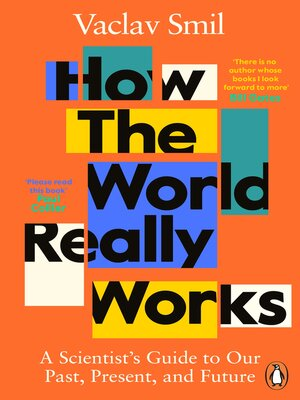Book Details
- Title: How the World Really Works
- Author: Vaclav Smil
- Reading Pace: Medium
- Rating: ★★★☆☆ (3/5)
- Amazon URL: https://amzn.to/3AG9vQi (Affliate Link)
- Audile URL: https://amzn.to/4fCQPQm (Affliate Link)
Summary
Ever wondered what really keeps our modern world running? Vaclav Smil breaks it down to four fundamental pillars: steel, cement, plastics, and ammonia. In this data-heavy exploration, he takes us on a journey through the intricate web of industrial systems that power our civilization, while challenging our assumptions about transitioning to a sustainable future.
Critical Analysis
Strengths
- Excellent breakdown of complex industrial systems
- Strong statistical foundation in historical analysis
- Clear explanation of the four pillars of civilization
- Comprehensive coverage of current industrial processes
Weaknesses
- Unsupported pessimism about renewable technologies
- Omission of nuclear waste management discussion
- Controversial stance on fossil fuels and developing nations
- Dismissive tone towards other thought leaders
- Inconsistent analytical rigor between historical and future predictions
Detailed Review
The first few chapters are impressively grounded in data, offering clear insights into how our modern world functions through the four pillars of civilization (steel, cement, plastics, and ammonia). Smil excels at breaking down complex systems into understandable components, backed by rigorous statistics and historical context.
However, the book takes a concerning turn when discussing future technologies, particularly renewables. For someone who builds his arguments on solid numerical evidence elsewhere, Smil’s pessimism about modern renewable technologies feels uncharacteristically unsupported. One would expect the same rigorous statistical analysis that characterizes his historical observations to be applied to his future predictions.
A significant oversight is the book’s lack of discussion on nuclear waste management, especially when analyzing energy transitions and their challenges. This omission feels particularly glaring given how central this issue is to global energy policy decisions.
Smil’s assertion that fossil fuels are the only pathway out of poverty for developing nations also seems to ignore current evidence. While fossil fuels historically provided the initial boost for industrialization, countries like China are now aggressively expanding their renewable energy capacity alongside their development. Renewables offer something fossil fuels cannot: energy independence from geopolitical constraints. Unlike natural gas pipelines that can be blocked or oil supplies that can be sanctioned, no one can prevent the sun from shining or the wind from blowing.
The book is also marked by unnecessarily dismissive remarks about other prominent thinkers like Yuval Noah Harari (Homo Deus) and Ray Kurzweil. Rather than engaging substantively with their arguments about future technological developments and societal changes, Smil opts for snide comments that add little to the discourse. This approach feels out of place in what is otherwise a data-driven work and detracts from the book’s academic credibility.
Personal Impact
Reading this book left me with mixed feelings, which explains my 3-star rating. While I deeply appreciated Smil’s masterful explanation of our industrial foundations through hard data and historical analysis, I found myself increasingly frustrated with his rigid stance on future developments.
As someone interested in technological progress and sustainable development, I was particularly disappointed by his dismissal of renewable energy potential without applying the same analytical rigor he uses elsewhere. His insistence that fossil fuels are the only viable path for developing nations feels outdated, especially given recent developments in countries like China.
Key Insights
- Modern civilization is built on and fundamentally depends on four key materials: steel, cement, plastics, and ammonia
- The complexity and scale of current industrial processes make rapid transitions extremely challenging
- According to Smil, fossil fuels remain essential for developing nations to industrialize and escape poverty
- The author argues that the challenges of transitioning to renewable energy are frequently underestimated
- Understanding our industrial systems requires rigorous statistical analysis and historical context
Notable Quotes
How long does it take for a tiny piglet to become a pork chop: weeks or years? The vast majority of Americans simply don’t know—and they have plenty of company
Fields will be displaced by urban high-rise agriculture, and synthetic products will ultimately eliminate the need to grow any food at all. Dematerialization, powered by artificial intelligence, will end our dependence on shaped masses of metals and processed minerals, and eventually we might even do without the Earth’s environment: who needs it if we are going to terraform Mars? Of course, these are all not just grossly premature predictions, they are fantasies fostered by a society where fake news has become common and where reality and fiction have commingled to such an extent that gullible minds, susceptible to cult-like visions, believe what keener observers in the past would have mercilessly perceived as borderline or frank delusion.
why do we let assorted tweets drive public opinion? (On Emmanuel Macron’s Tweet)
If you want to eat wild fish with the lowest-possible fossil carbon footprint, stick to sardines.
“How can those without any special knowledge take sides or make any sense of these disputes that now often end in retractions or the dismantling of previously dominant claims?”
“Many people nowadays admiringly quote the performance gains of modern computing (“so much data”) or telecommunication (“so much cheaper”)—but what about harvests? In two centuries, the human labor to produce a kilogram of American wheat was reduced from 10 minutes to less than two seconds. This is how our modern world really works”
Recommendations
Should you pick up this book? If you’re fascinated by how our modern world actually functions and love diving into data-driven explanations, then absolutely - but with a caveat. While you’ll get incredible insights into the industrial systems that shape our world, you might find yourself raising an eyebrow at some of Smil’s takes on future tech. I’d especially recommend this to my fellow skeptics who enjoy challenging authors’ assumptions and aren’t afraid to disagree with expert opinions. Just be prepared for some thought-provoking (and occasionally frustrating) discussions about where our world is heading!
